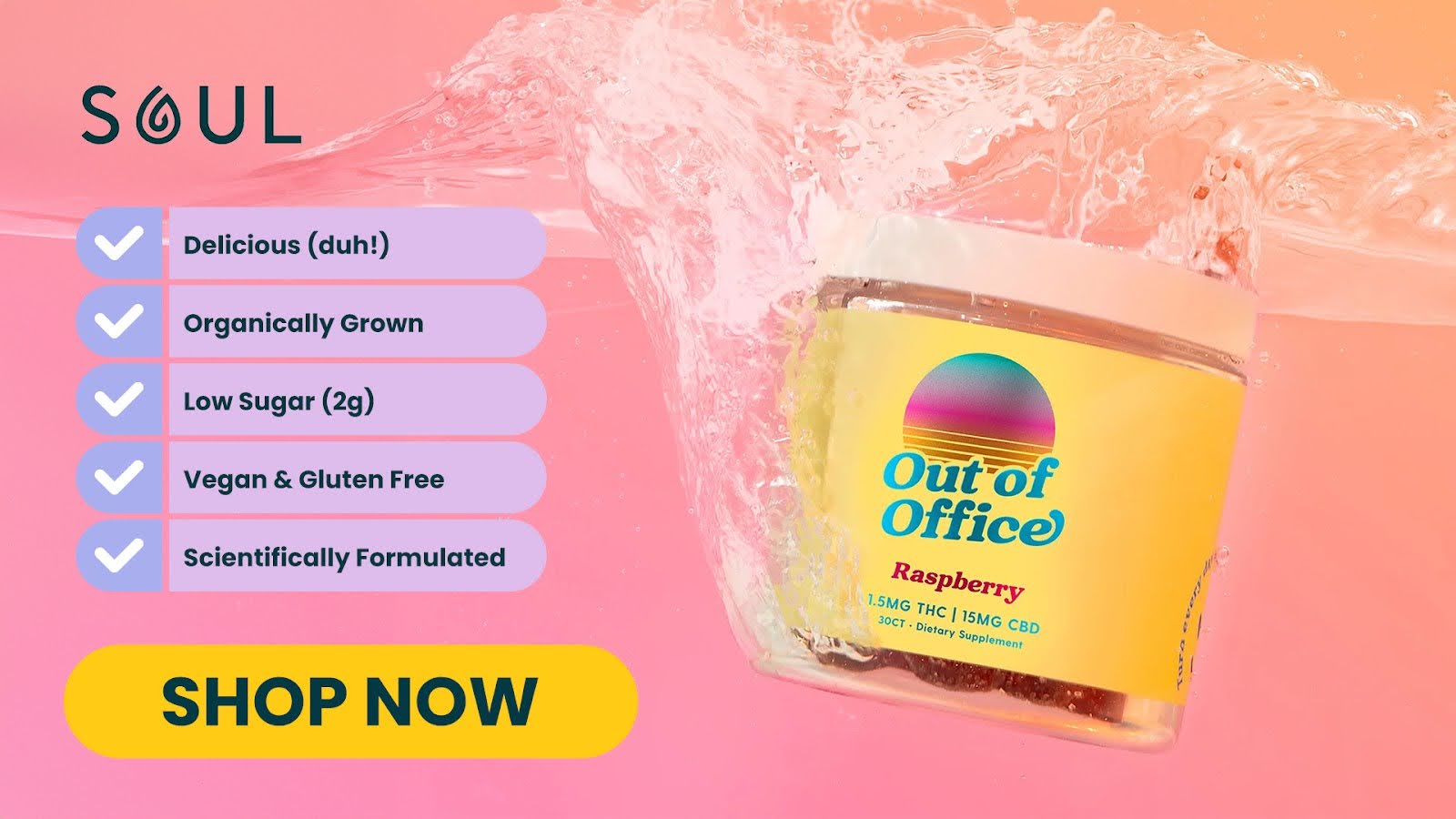
Key Takeaways:
- Strict Laws: Wisconsin maintains strict laws against recreational THC use, only allowing certain non-psychoactive cannabinoids like CBD for medical purposes.
- Legal Consequences: Penalties for THC possession in Wisconsin can be severe, with potential felony charges for repeated offenses or possession of large amounts.
- Changing Landscape: Public opinion and legislative discussions suggest potential changes to THC legislation in Wisconsin, influenced by economic factors and advocacy.
Soul, a leading supplier of premium, lab-tested THC products, is dedicated to advancing your wellness journey with superior cannabis products. Our carefully chosen assortment provides a smooth experience catered to your lifestyle requirements, be it leisure, healing, or relaxation. We'll talk about Wisconsin's legal environment for THC in this tutorial. We'll look at the state's present rules, the differences between medical and recreational usage, the consequences of possessing THC, and how federal laws affect local legislation. We will also discuss the lawful options that are accessible in Wisconsin, providing guidance to anyone looking for safe and legal cannabis solutions. Come along as we explore the nuances of Wisconsin's legalization of THC, making sure you are aware and in compliance.
Understanding The Difference Between Medical And Recreational Use
In Wisconsin, the distinction between medical and recreational use of THC is significant, primarily because the state has different regulations for each. Medical use of cannabis products, including THC, is restricted to very specific medical conditions and typically requires a doctor's prescription and state-issued medical card. Currently, Wisconsin allows the use of cannabidiol (CBD), a non-psychoactive compound in cannabis, for patients with certain medical conditions but remains stringent on THC-containing products.
On the other hand, recreational use of THC is illegal in Wisconsin. This means any use of cannabis that contains psychoactive levels of THC without a medical reason is against state law, and possession or use can lead to criminal charges. Understanding these differences is crucial for residents and visitors to the state to ensure they comply with local laws.
Current Laws Governing THC In Wisconsin
Wisconsin maintains specific and stringent regulations regarding the use and distribution of THC, reflecting a cautious approach to cannabis-related laws. Below, we detail the current legal framework governing THC in the state:
Legal Status of THC
In Wisconsin, any recreational use of THC is strictly illegal. The state enforces stringent laws that prohibit the possession, sale, and distribution of any cannabis products containing psychoactive levels of THC. These prohibitions are in place regardless of the amount involved, emphasizing the state's firm stance against recreational cannabis.
Medical Use
The state's approach to medical cannabis is conservative, permitting only the use of cannabidiol (CBD) products. These non-psychoactive CBD products can be legally used for medical purposes but only under stringent conditions. Patients must have a specific medical diagnosis such as seizures or other serious health conditions and require a certification from a licensed Wisconsin physician. This policy reflects a tightly controlled framework for medical cannabis, focusing solely on CBD rather than THC.
Hemp-Derived Products
After the 2018 Farm Bill, Wisconsin adapted its laws to allow for the cultivation and sale of hemp-derived products, provided they contain less than 0.3% THC by dry weight. This move has facilitated a growing industry in hemp agriculture and related products, such as CBD oils, creams, and supplements, that meet the low THC threshold and are thus legal under both state and federal law.
Local Ordinances
Recognizing the diversity in public opinion and local government stances across the state, some localities in Wisconsin have adopted their own ordinances that differ slightly from state law. These local regulations may offer more lenient penalties for the possession of small amounts of THC, reflecting a more progressive approach compared to the state's overall strict regulations. These local variations are particularly notable in larger cities or more liberal areas, where local governments seek to prioritize resources differently.
Penalties For THC Possession In Wisconsin
Navigating the legal landscape regarding THC in Wisconsin reveals a range of penalties that escalate with the severity of the offense. Below, we detail what individuals might face if found in possession of THC in the state:
First Offense
For individuals caught with a small amount of THC for the first time, typically under 25 grams, the offense is classified as a misdemeanor. This initial violation can lead to significant legal consequences, including a fine of up to $1,000 and/or imprisonment for up to six months. This level of penalty underscores Wisconsin's tough stance on even minor drug offenses, aiming to deter future drug use and possession.
Subsequent Offenses
If a person is found guilty of possessing THC after a first offense, the charges escalate significantly. Subsequent offenses are treated as felonies, reflecting the state's intention to impose stricter penalties on repeat offenders. These penalties can include higher fines and longer terms of imprisonment, potentially impacting the offender's life long-term with the serious implications of a felony record.
Large Quantities
The possession of large quantities of THC suggests intent to distribute, rather than personal use, and is treated as a major criminal offense in Wisconsin. Such cases are prosecuted under felony charges, with potential consequences including long-term imprisonment, substantial fines, and permanent marks on an individual’s criminal record. The severity of these penalties is meant to combat the distribution network and reduce the availability of THC products in the state.
Paraphernalia
In Wisconsin, possessing paraphernalia associated with THC use, such as pipes, bongs, or rolling papers, can also lead to legal penalties. These charges can be additional to those for possessing THC itself, and can include fines and imprisonment. The state's laws aim to discourage not only the use and possession of THC but also the means to facilitate its use.
Impact Of Federal Laws On Wisconsin's THC Regulations
The interplay between federal regulations and state laws significantly influences how THC is governed in Wisconsin. Here's a breakdown of the major federal impacts on the state’s approach to managing and regulating THC:
Controlled Substances Act
Under the Federal Controlled Substances Act, THC is classified as a Schedule I drug, indicating it is considered to have a high potential for abuse and no accepted medical use in treatment in the United States. This classification significantly affects state policy and enforcement, as Wisconsin must align its drug regulations with federal standards, which currently do not recognize any legitimate use of THC, influencing the strictness of state laws.
Conflict With State Laws
Despite the movement in many states towards decriminalization or legalization of THC for medical and recreational uses, Wisconsin has to navigate the complex landscape of staying compliant with overarching federal regulations. This conflict can create legal and operational challenges for state authorities, who must enforce state laws that are incongruent with the more liberal policies of neighboring states and evolving public perceptions.
Federal Enforcement
Federal law enforcement agencies actively enforce federal drug laws in Wisconsin. This enforcement is particularly stringent in cases of interstate trafficking or large-scale drug operations, where federal agencies such as the DEA step in to lead investigations and prosecutions. The presence of federal enforcement efforts ensures that state compliance with federal drug policy remains tight and significantly influences how state laws are implemented and prosecuted.
Funding And Resources
Federal influence extends beyond legislation and enforcement; it also impacts state decisions through the allocation of funding and resources. Federal funding for drug enforcement and public health initiatives is often contingent upon state compliance with federal drug policies. This funding can support various programs, from drug prevention and education to treatment facilities, which shapes how states like Wisconsin manage their drug-related public health policies.
Legal Alternatives To THC In Wisconsin
In Wisconsin, where THC remains largely illegal, individuals seeking legal alternatives have several options. Below is an overview of these alternatives and their legal status in the state:
CBD Products
In Wisconsin, cannabidiol (CBD) products derived from hemp containing less than 0.3% THC are legal and widely available. These products are sought after for their potential therapeutic benefits, such as pain relief, anti-inflammatory properties, and anxiety reduction, without inducing the psychoactive effects associated with THC. The availability of these products offers a legal alternative for residents looking to explore the health benefits of cannabis without violating state laws.
Delta-8 THC
Delta-8 THC occupies a legal gray area in Wisconsin. It is a cannabinoid similar to THC but with less potent psychoactive effects, making it somewhat less controversial. Although it is accessible in some local stores and dispensaries, the legal status of Delta-8 THC remains uncertain and could potentially change as state regulators clarify their stance or introduce new regulations. Consumers interested in Delta-8 should stay informed about the evolving legal landscape to ensure compliance.
Prescription Cannabinoids
Certain cannabinoids have been approved by the FDA and are legally available in Wisconsin with a prescription. These include Epidiolex, a highly purified form of CBD used primarily to treat severe forms of epilepsy, and synthetic THC products like Marinol, which are used to manage nausea and weight loss in cancer and AIDS patients. These prescription options provide legal ways for patients to gain the benefits of cannabinoids under the supervision of a healthcare provider.
Industrial Hemp
Beyond medicinal or recreational alternatives, industrial hemp products are legal in Wisconsin. These include items made from the fibers, seeds, and oils of the hemp plant, which are used in a wide range of products from textiles and biofuels to food items and body care products. Industrial hemp does not contain significant levels of THC, hence its products do not have psychoactive properties, making them suitable and legal for a broad range of uses.
Future Outlook On THC Legislation In Wisconsin
As discussions around cannabis continue to evolve nationally, Wisconsin's stance on THC is under scrutiny and could see significant changes in the near future. Below, we delve into what might be expected regarding the legislation of THC in the state:
- Legislative Trends: There is growing advocacy and legislative discussion around the possibility of medical Hemp legalization. Observers are closely watching neighboring states that have relaxed their THC laws, which may influence Wisconsin's approach.
- Public Opinion: Surveys and public opinion polls increasingly show support for medical and recreational Hemp legalization among Wisconsin residents. This shift in public sentiment could drive legislative changes in the coming years.
- Economic Factors: The potential economic benefits of legalizing THC, such as increased tax revenue and job creation, are becoming more compelling arguments for legislators and policymakers.
- Regulatory Developments: Future regulatory changes could focus on providing clear guidelines for the use and sale of medical THC products, aligning state laws more closely with federal reforms, if any.
Final Thoughts
As Wisconsin deals with the complicated rules about THC, it's really important for people living there to know what's going on with the laws and any changes that might happen. You should keep up with the latest news on THC laws since they can change when new laws are made or people's opinions shift. It's crucial to follow the current laws to avoid any trouble with the law. Make sure you know the difference between legal CBD products and illegal THC products. If you use CBD or other legal cannabinoids for medical reasons, make sure you follow all the state rules and have the right paperwork or prescriptions. If you want to see changes in the THC laws, think about joining groups that are working on this or talk to your local lawmakers to share your thoughts.
Read also:
Frequently Asked Questions About THC Legality In Wisconsin
Is it legal to grow Hemp plants for personal use in Wisconsin?
No, it is currently illegal to grow Hemp plants for personal use in Wisconsin, regardless of the amount or purpose.
Can you legally purchase THC products online in Wisconsin?
Purchasing THC products online and having them shipped to Wisconsin is illegal under state and federal laws.
Are there any legal protections for employees using CBD products in Wisconsin?
Wisconsin does not have specific legal protections for employees using CBD products, and employers can enforce their own drug policies.
Can non-residents possess THC products while visiting Wisconsin?
Non-residents are subject to the same THC possession laws as residents, meaning possession of THC without a valid medical reason is illegal.
Is there any difference in THC laws between Wisconsin counties?
While state law applies uniformly, some local jurisdictions may have different penalties for possession, typically more lenient than state penalties.
What should I do if I'm charged with THC possession in Wisconsin?
It's advisable to consult with a legal professional who specializes in drug laws in Wisconsin to understand your rights and potential defenses.
Are there educational programs in Wisconsin that discuss THC use and legality?
Yes, some community and educational programs provide information on drug use, including THC, focusing on legal implications and safety.
How does Wisconsin regulate CBD products compared to THC products?
CBD products derived from hemp with less than 0.3% THC are legal, while products containing higher levels of THC are generally prohibited unless specified for medical use.
Can doctors in Wisconsin prescribe THC for medical conditions?
Doctors in Wisconsin cannot prescribe THC due to its status as a Schedule I controlled substance, but they can recommend CBD for certain conditions.
Are there any efforts to reform THC laws in Wisconsin?
Yes, there are ongoing discussions and proposals in the state legislature aimed at reforming the laws regarding medical and potentially recreational THC.
Sources:
- Hansen, C., Alas, H., & Davis Jr., E. (2021, June 30). Where Is Marijuana Legal? A Guide to Hemp Legalization. US News & World Report. https://www.usnews.com/news/best-states/articles/where-is-Marijuana-legal-a-guide-to-Hemp-legalization
- Washington DC Hemp Laws | WashingtonDCCannabis.org. (n.d.). Washington D.C. Cannabis Information Portal. https://washingtondccannabis.org/laws
- Inc, G. (2021, November 4). Support for Legal Marijuana Holds at Record High of 68%. Gallup.com. https://news.gallup.com/poll/356939/support-legal-Marijuana-holds-record-high.aspx
- Dorbian, I. (n.d.). Despite Some Stumbles, Total Sales In U.S. Cannabis Market Could Soar To $50.7 Billion By 2028, Says Top Researcher. Forbes. Retrieved October 18, 2023, from https://www.forbes.com/sites/irisdorbian/2023/02/15/despite-some-stumbles-total-sales-in-us-cannabis-market-could-soar-to-507-billion-by-2028-says-top-researcher/?sh=1f90e293164d






